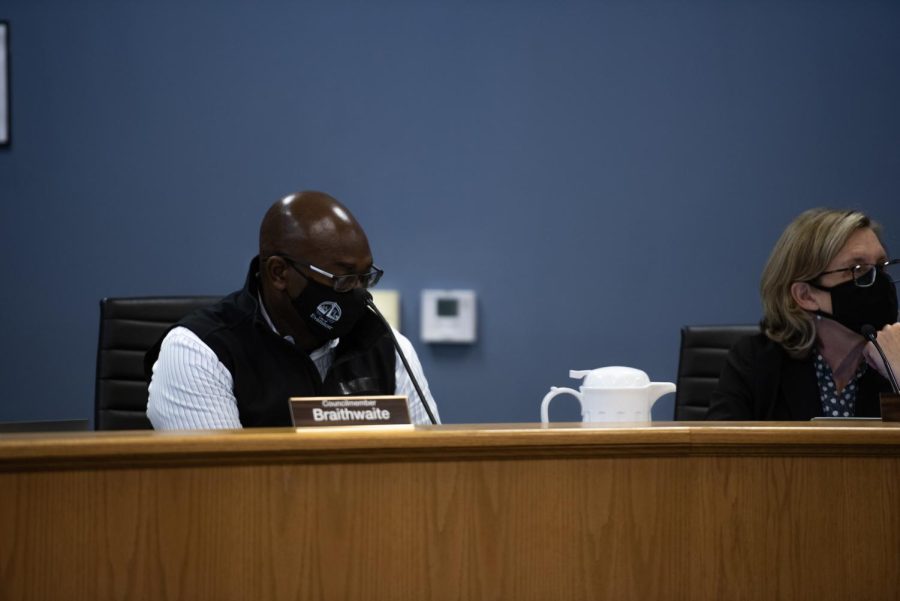Reparations Committee discusses recipients’ needs, program expansion
Ald. Peter Braithwaite (2nd). As Chair of Evanston’s Reparations Committee, Braithwaite led a discussion about the Restorative Housing Program on Thursday.
April 7, 2022
The first residents to receive reparations through Evanston’s Restorative Housing Program have decided how they plan to use the funds, according to an update at a Reparations Committee meeting Thursday.
“We felt that it was especially important, because this is so brand new, to meet one-on-one with the families,” said Ald. Peter Braithwaite (2nd), committee chair. “Our staff was able to meet with them in their home and actually see what they wanted to do.”
In the city’s — and the nation’s — first effort to issue reparations to Black residents, the city focused on Black homeowners who have been impacted by the discriminatory legacies of systemic housing segregation. Black residents who qualify can choose for the up to $25,000 they receive to go to home mortgage assistance, home improvement, home purchase or a combination.
Audrey Thompson, the interim director of Parks and Recreation, announced that six of the first 16 residents to receive reparations chose home improvement assistance, two chose mortgage assistance and six chose a combination of both. One resident elected for the funds to go toward purchasing a home.
Thompson said the undecided resident, currently a renter, is unsure if she would be able to get a mortgage even with the stipend, which has been criticized by some as an insufficient help to offset Evanston’s high housing prices. If she’s unable to do so, Thompson said, it would be “very difficult” for her to use the grant.
“To change (the disbursement process) at this point would likely get us into some legal trouble,” Thompson said. “Unfortunately, it doesn’t leave us…all the flexibility of maneuvering to accommodate these cases as they come up.”
If the renter either doesn’t qualify for a mortgage or decides she doesn’t want to purchase a house, Ald. Devon Reid (8th) urged the committee to explore the option of distributing funds in another way.
According to committee member Carlis Sutton, the Restorative Housing Program’s focus on homeowners is not meant to “discriminate against anybody in the community that does not own a home.”
“We do have an obligation both legally and morally to address those people who have received harm, and what is the best way in our small capacity to do it?” Sutton said.
The city has indeed approved more residents to receive Evanston reparations, according to Assistant to the City Manager Tasheik Kerr.
Kerr said, as of Wednesday, the city has verified 146 residents who are the descendants of Black residents who lived in Evanston from 1919 to 1969. According to Kerr, the city needs to follow up with 56 more residents, as they might be missing the documentation necessary for eligibility.
The committee also highlighted Evanston’s role in a national conversation about developing local reparations programs.
Last week, Braithwaite and other committee members traveled to Washington, D.C., to attend the African-American Redress Network’s Reparations 2022 Conference to meet with local leaders from across the country.
“It’s really helpful to find out what other institutions are doing so that we can learn,” committee member Claire McFarland Barber said. “It was also therapeutic to get together. It’s a tough topic for us (and) very emotional, but we have to at least stay focused.”
The city looks to expand reparations programs. Reid highlighted an idea to tax wealthy lakefront homeowners to generate funds to redress Black displacement from the area.
Thompson also emphasized there are additional resources available. Because of a grant from the Evanston Community Foundation, program recipients can receive free home repair services from the nonprofit Rebuilding Together North Suburban Chicago. The organization provides free repair services and home improvements to low-income homeowners.
Braithwaite continually emphasized that the Restorative Housing Program is just the first step.
“This 25,000 does not erase 400 years of slavery,” Braithewaite said. “What we’re doing here is so much bigger than a $25,000 grant, as we’re in this first stage.”
Email: jorjasiemons2024@u.northwestern.edu
Twitter: @JorjaSiemons
Related Stories:
— Reparations Committee talks next steps for Restorative Housing Program
— Third-party intermediary to disperse first reparations funds



